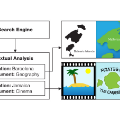Deception detection in conversations is a challenging yet important task, having pivotal applications in many fields such as credibility assessment in business, multimedia anti-frauds, and custom security. Despite this, deception detection research is hindered by the lack of high-quality deception datasets, as well as the difficulties of learning multimodal features effectively. To address this issue, we introduce DOLOS\footnote {The name ``DOLOS" comes from Greek mythology.}, the largest gameshow deception detection dataset with rich deceptive conversations. DOLOS includes 1,675 video clips featuring 213 subjects, and it has been labeled with audio-visual feature annotations. We provide train-test, duration, and gender protocols to investigate the impact of different factors. We benchmark our dataset on previously proposed deception detection approaches. To further improve the performance by fine-tuning fewer parameters, we propose Parameter-Efficient Crossmodal Learning (PECL), where a Uniform Temporal Adapter (UT-Adapter) explores temporal attention in transformer-based architectures, and a crossmodal fusion module, Plug-in Audio-Visual Fusion (PAVF), combines crossmodal information from audio-visual features. Based on the rich fine-grained audio-visual annotations on DOLOS, we also exploit multi-task learning to enhance performance by concurrently predicting deception and audio-visual features. Experimental results demonstrate the desired quality of the DOLOS dataset and the effectiveness of the PECL. The DOLOS dataset and the source codes are available at https://github.com/NMS05/Audio-Visual-Deception-Detection-DOLOS-Dataset-and-Parameter-Efficient-Crossmodal-Learning/tree/main.
翻译:暂无翻译



